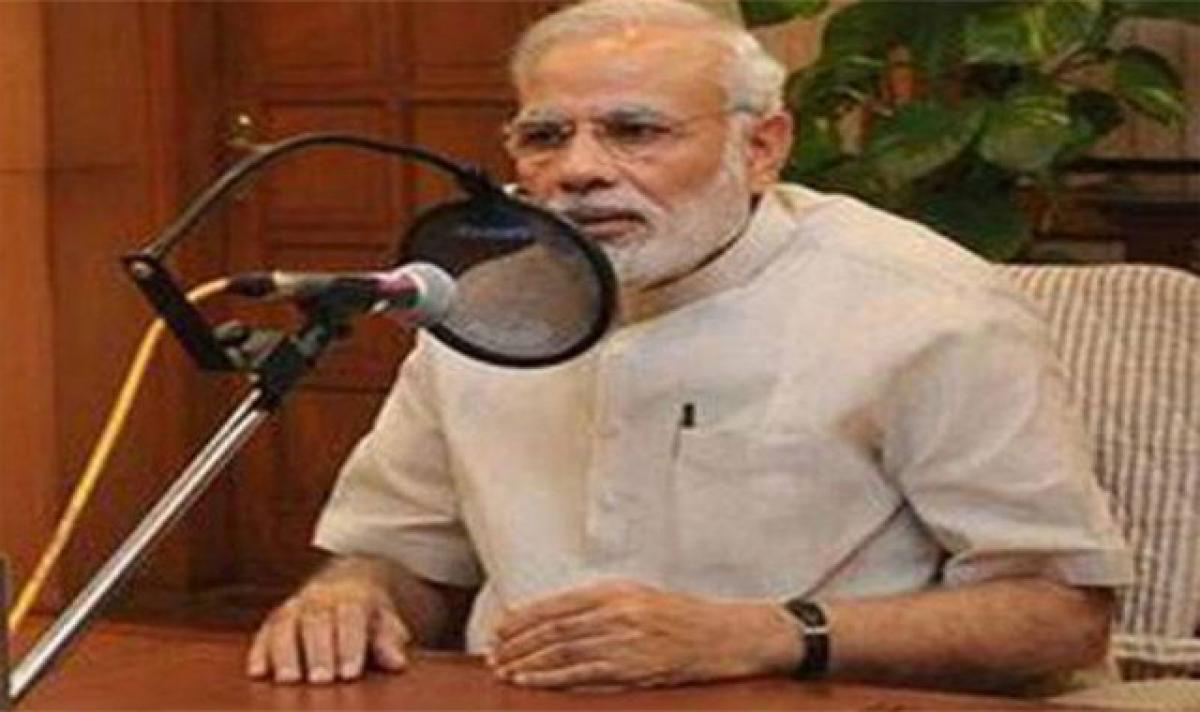Live
- YS Sharmila to file nomination for Kadapa Lok Sabha constituency today
- Rains lash parts of Hyderabad bringing respite from heat
- Peddireddi continues tirade against former CM Kiran
- DCA raids three quacks
- ‘Kuppam Gadda-TDP Adda’, asserts Bhuvaneswari
- Never made people regret voting for me: Kishan Reddy
- ‘Garuda Prasadam’ at Chilkur Balaji throws traffic haywire on Moinabad Road
- GHMC approves 11,000 building permissions
- Members of Legislative Council Join YSR Congress Party in Massive Election Campaign in Buchireddypalem Mandal
- YV Ramireddy Criticizes MLA Sridhar Reddy for His Comments on Adala Prabhakar Reddy
Just In

“India’s cultural diversity is its strength. In India, people practicing idol worship, people who did not follow idol worship, atheists and people believing in god are all living in peace and harmony”. These words of Prime Minister Narendra Modi on his ‘Mann ki Baat’ should serve as an eye opener for the fringe elements working within the ruling dispensation.
“India’s cultural diversity is its strength. In India, people practicing idol worship, people who did not follow idol worship, atheists and people believing in god are all living in peace and harmony”. These words of Prime Minister Narendra Modi on his ‘Mann ki Baat’ should serve as an eye opener for the fringe elements working within the ruling dispensation.
Modi has rightly reflected on the idea of India that nurtured this great civilization for millennia. The divisive trends that are determined to challenge this country’s cultural diversity are an affront to this notion of India. Given this plurality of Indian society, as the distinguished historian Romila Thapar exhorted, we have to cease to think of ourselves as identified primarily by religion, caste, or language and start thinking of ourselves primarily as equal citizens of one nation, both in theory and in practice.
As Amartya Sen repeatedly emphasised, the long tradition of argument and public debate, of intellectual pluralism and generosity informs India’s history. Infact, India as a mainly Hindu country is a Western description. Hinduism as an inclusive philosophy rather than an exclusionist, divisive religion has defined the diverse and pluralistic tradition of Indian civilization.
Hinduism is mature enough and magnanimous enough to accommodate dissenting views and even profound skepticism. The idea of India, therefore, rejects this bellicose version of the religion. In our heterogeneity and in our openness lies our pride, not our disgrace Indian spiritual thinkers and great texts have always upheld this view of India.
Upanishads say “let the noble thoughts come to us from every side.” Nothing else can be more accommodative and universal than this wisdom. ”There are as many paths to God as there are faiths” These are the pearls of wisdom from Sri Ramakrishna. Lord Krishna reveals in The Bhagavad Gita, “He who has let go of hatred, who treats all beings with kindness and compassion, who is always serene, … that is the man I love best.” the Rig Veda mantra, Ekam sad vipra bahudha vadanti (There is one truth, wise men explain it in various ways) is the essence of India’s spiritual tradition that celebrates the true idea of India.
The historical legacy of Indian philosophical tradition was a witness to myriad schools of thought like Nyaya, Vaisheshika, Samkhya, Yoga, Mimamsa and Vedanta, Jain, Buddhist, Ajivika and Carvaka etc. No civilization can prosper if it is static and isolated. There is a vigorous tradition of arguing in India. This interactive character of India defined its progress through the centuries. As Tagore said, let us unite, not in spite of our differences, but through them. Let my country not be fragmented with narrow domestic walls.
Officially, there are at least 1,618 languages in India, 6,400 castes, six major religions (four of them that originated in these lands), six anthropologically defined ethnic groups that constitute the nation called India. The unity of India has been and shall always be a unity in diversity.

© 2024 Hyderabad Media House Limited/The Hans India. All rights reserved. Powered by hocalwire.com







